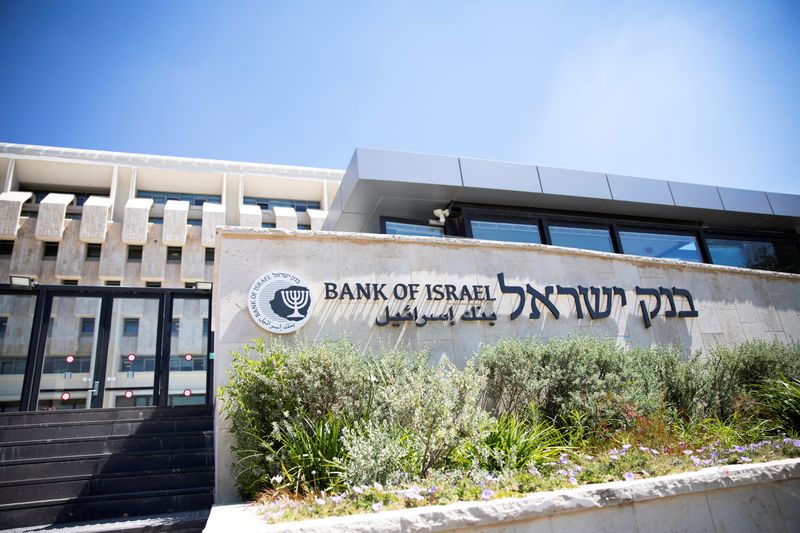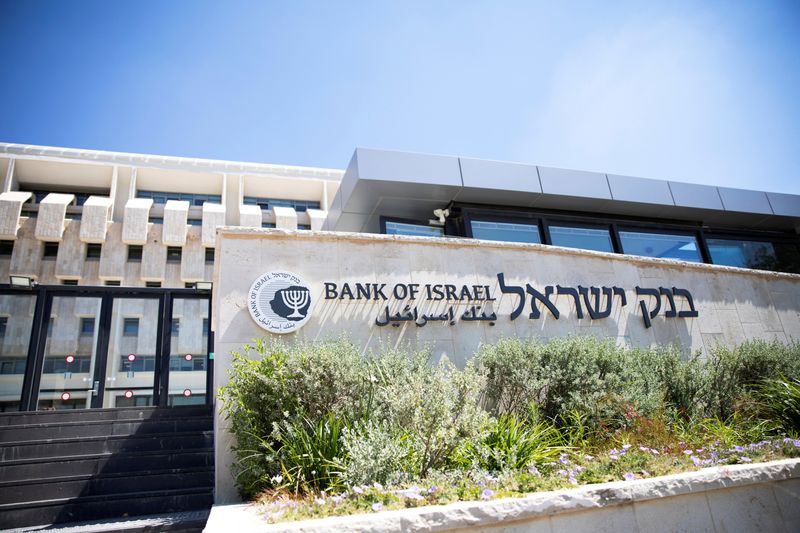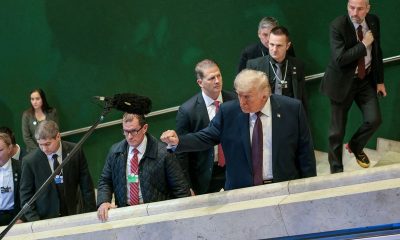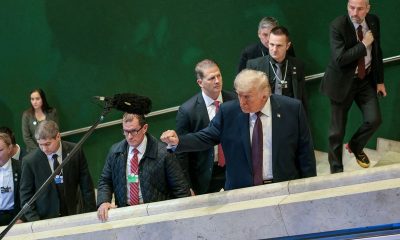Economy
Bank of Israel holds key rate, seeks to keep financial system stable


© Reuters. FILE PHOTO: The Bank of Israel building is seen in Jerusalem June 16, 2020. Picture taken June 16, 2020. REUTERS/Ronen Zvulun/File Photo
By Steven Scheer and Ari Rabinovitch
JERUSALEM (Reuters) – Israel’s economy will take a hit from the war against Hamas but should quickly recover, Bank of Israel Governor Amir Yaron said on Monday after the central bank left short-term borrowing costs unchanged for a third straight decision.
Yaron said policymakers spent two days discussing the economic effects of the war but opted to leave the benchmark interest rate at 4.75%.
The committee had raised rates 10 straight times in an aggressive tightening cycle aimed at battling inflation, that has taken the rate from 0.1% last April before pausing in July and again in August.
“I’m pretty skeptical that at the moment lowering the interest rate would make demand jump,” Yaron told a news conference.
Officials have cautioned that steep rate cuts at the moment could further weaken the shekel, which is already at an 8-1/2 year low versus the dollar, and push up inflation.
The inflation rate eased to 3.8% in September from 4.1% in August but remained above an annual target range of between 1% and 3%. In updated forecasts, the Bank of Israel’s economists projected inflation moving to a 2.9% rate in the coming year and to end 2024 at 2.5%.
“Israel’s risk premium went up … we want first and foremost to ensure that the financial systems are working,” Yaron said. “We want to stabilize the financial side because certainly if there are problems there, there will be even bigger problems on the real (economy) side.”
Rather than cut rates, Yaron said the central bank was taking steps that act like monetary easing, such as working with banks to allow those impacted by the conflict to defer or freeze loan repayments.
“Only when we get to recovery (after the war) can we think what do on the interest rate side,” he said. “For now, uncertainty is very high.”
GROWTH ESTIMATE
The bank’s staff believe the key interest rate will drop to between 4.0% and 4.25% in the coming year.
As a consequence of the war that began on Oct. 7 after Hamas attacked Israeli towns in the worst assault on civilians in the country’s history, the bank trimmed Israel’s growth estimate for 2023 to 2.3% from 3.0% and to 2.8% next year from a prior 3.0%.
The forecasts are based on the conflict being concentrated in the south on the Gaza border in the fourth quarter, but a longer or shorter timespan – and developments in the war that would expand to Hezbollah on the Lebanese border or other areas – would change the estimates substantially, Yaron said.
“We have known how to recover from difficult periods in the past and to return rapidly to prosperity. I have no doubt that it will do so this time as well,” he said.
The central bank is also working to keep the shekel contained by selling $30 billion of foreign currency. With no rate move widely expected, the shekel was steady against the dollar at a 4.06 rate, its weakest since March 2015.
Since the start of the war, the shekel has shed 5% and is down 15.5% in 2023.
Government officials have said they will spend what they need on the war and on compensation for those impacted, but Yaron cautioned of the need for some fiscal restraint. The central bank projects the debt to GDP ratio growing to 62% this year and to 65% in 2024 from 60.5% in 2022.
“It is important to continue conducting responsible fiscal policy, and to convey this to the markets, which today more than ever are following the activity in Israel,” Yaron said, adding less crucial expenses should be cut.
Fitch last week put Israel’s credit ratings on credit watch negative while Moody’s (NYSE:) put its ratings on review for a possible downgrade.
(This story has been corrected to change the year to ‘2015’ from ‘2020’ in paragraph 14)
Economy
Russian central bank says it needs months to make sure CPI falling before rate cuts -RBC


© Reuters. Russian Central Bank Governor Elvira Nabiullina attends a news conference in Moscow, Russia June 14, 2019. REUTERS/Shamil Zhumatov/File Photo
MOSCOW (Reuters) – Russia’s central bank will need two to three months to make sure that inflation is steadily declining before taking any decision on interest rate cuts, the bank’s governor Elvira Nabiullina told RBC media on Sunday.
The central bank raised its key interest rate by 100 basis points to 16% earlier in December, hiking for the fifth consecutive meeting in response to stubborn inflation, and suggested that its tightening cycle was nearly over.
Nabiullina said it was not yet clear when exactly the regulator would start cutting rates, however.
“We really need to make sure that inflation is steadily decreasing, that these are not one-off factors that can affect the rate of price growth in a particular month,” she said.
Nabiullina said the bank was taking into account a wide range of indicators but primarily those that “characterize the stability of inflation”.
“This will take two or three months or more – it depends on how much the wide range of indicators that characterize sustainable inflation declines,” she said.
The bank will next convene to set its benchmark rate on Feb. 16.
The governor also said the bank should have started monetary policy tightening earlier than in July, when it embarked on the rate-hiking cycle.
Economy
China identifies second set of projects in $140 billion spending plan


© Reuters. FILE PHOTO: Workers walk past an under-construction area with completed office towers in the background, in Shenzhen’s Qianhai new district, Guangdong province, China August 25, 2023. REUTERS/David Kirton/File Photo
SHANGHAI (Reuters) – China’s top planning body said on Saturday it had identified a second batch of public investment projects, including flood control and disaster relief programmes, under a bond issuance and investment plan announced in October to boost the economy.
With the latest tranche, China has now earmarked more than 800 billion yuan of its 1 trillion yuan ($140 billion) in additional government bond issuance in the fourth quarter, as it focuses on fiscal steps to shore up the flagging economy.
The National Development and Reform Commission (NDRC) said in a statement on Saturday it had identified 9,600 projects with planned investment of more than 560 billion yuan.
China’s economy, the world’s second largest, is struggling to regain its footing post-COVID-19 as policymakers grapple with tepid consumer demand, weak exports, falling foreign investment and a deepening real estate crisis.
The 1 trillion yuan in additional bond issuance will widen China’s 2023 budget deficit ratio to around 3.8 percent from 3 percent, the state-run Xinhua news agency has said.
“Construction of the projects will improve China’s flood control system, emergency response mechanism and disaster relief capabilities, and better protect people’s lives and property, so it is very significant,” the NDRC said.
The agency said it will coordinate with other government bodies to make sure that funds are allocated speedily for investment and that high standards of quality are maintained in project construction.
($1 = 7.1315 renminbi)
Economy
Russian central bank says it needs months to make sure CPI falling before rate cuts -RBC


© Reuters. Russian Central Bank Governor Elvira Nabiullina attends a news conference in Moscow, Russia June 14, 2019. REUTERS/Shamil Zhumatov/File Photo
MOSCOW (Reuters) – Russia’s central bank will need two to three months to make sure that inflation is steadily declining before taking any decision on interest rate cuts, the bank’s governor Elvira Nabiullina told RBC media on Sunday.
The central bank raised its key interest rate by 100 basis points to 16% earlier in December, hiking for the fifth consecutive meeting in response to stubborn inflation, and suggested that its tightening cycle was nearly over.
Nabiullina said it was not yet clear when exactly the regulator would start cutting rates, however.
“We really need to make sure that inflation is steadily decreasing, that these are not one-off factors that can affect the rate of price growth in a particular month,” she said.
Nabiullina said the bank was taking into account a wide range of indicators but primarily those that “characterize the stability of inflation”.
“This will take two or three months or more – it depends on how much the wide range of indicators that characterize sustainable inflation declines,” she said.
The bank will next convene to set its benchmark rate on Feb. 16.
The governor also said the bank should have started monetary policy tightening earlier than in July, when it embarked on the rate-hiking cycle.

 Forex4 years ago
Forex4 years agoForex Today: the dollar is gaining strength amid gloomy sentiment at the start of the Fed’s week

 Forex3 years ago
Forex3 years agoUnbiased review of Pocket Option broker

 Forex3 years ago
Forex3 years agoDollar to pound sterling exchange rate today: Pound plummeted to its lowest since 1985

 Forex3 years ago
Forex3 years agoHow is the Australian dollar doing today?

 Cryptocurrency3 years ago
Cryptocurrency3 years agoWhat happened in the crypto market – current events today

 World3 years ago
World3 years agoWhy are modern video games an art form?

 Commodities3 years ago
Commodities3 years agoCopper continues to fall in price on expectations of lower demand in China

 Economy3 years ago
Economy3 years agoCrude oil tankers double in price due to EU anti-Russian sanctions

























